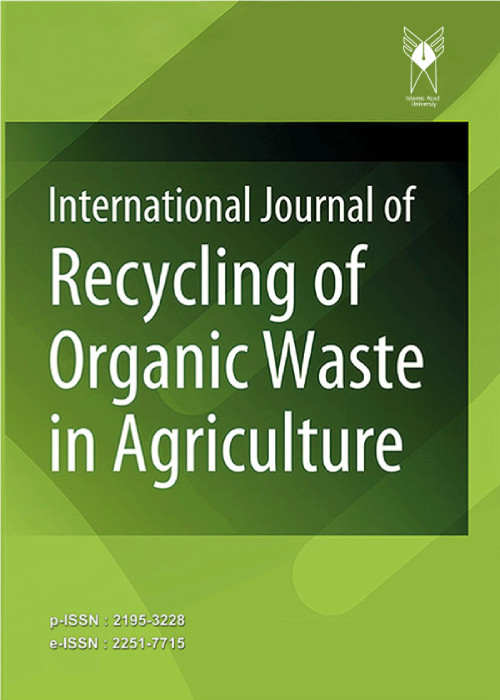Effect of date palm waste compost on forage alfalfa growth, yield, seed yield and minerals uptake
Author(s):
Article Type:
Research/Original Article (دارای رتبه معتبر)
Abstract:
Purpose
Date palm (Phoenix dactylifera L.) is one of the predominant fruit trees grown in oases ecosystems (Southern Mediterranean regions) and produces several wastes during practicing cultivation since fruit and bunch thinning is frequently applied. Yet, the valorization of date palm wastes as bioresources has received little attention. The main objective for the present research is to assess palm trees compost (P-compost) as organic fertilizer for alfalfa (Medicago sativa L.).Methods
The experiment was carried out in an experimental field involving four replicates and three soil amendment treatments (1) control, conventional mineral fertilizer diammonium phosphate, (2) 30 t ha−1 of cow manure, and (3) 30 t ha−1 of palm tree compost (P-compost). Plots were planted on with alfalfa and the measurements of studied traits (growth, yield, seed yield and minerals uptake) were determined for two crop seasons (2010 and 2011).Results
Compared with untreated soil, the palm compost application at 30 t ha−1 improved significantly both organic matter and water retention capacity of the soil and decreased the electrical conductivity (− 70%). Furthermore, palm compost supply significantly increased fresh biomass production of alfalfa by 21 and 28%, respectively, during the first and second seasons. Also, it enhanced the grain yield and growth rate (stem length and leafs expansion) of this species. At the first crop season, the palm compost application had a positive impact on minerals nutrition compared to the control treatment, with improving rates of 32% for phosphorus, 25% for potassium and 6% for nitrogen. In addition, these contents were higher than in plants grown under cow manure amendment. However, at the second season, the palm compost improved only P and N contents.Conclusions
This preliminary finding suggests that palm compost at moderate dose (30 t ha−1) could be highly beneficial for forage plant yield.Keywords:
Language:
English
Published:
International Journal of Recycling of Organic Waste in Agriculture, Volume:7 Issue: 1, Winter 2018
Pages:
1 to 9
magiran.com/p1855299
دانلود و مطالعه متن این مقاله با یکی از روشهای زیر امکان پذیر است:
اشتراک شخصی
با عضویت و پرداخت آنلاین حق اشتراک یکساله به مبلغ 1,390,000ريال میتوانید 70 عنوان مطلب دانلود کنید!
اشتراک سازمانی
به کتابخانه دانشگاه یا محل کار خود پیشنهاد کنید تا اشتراک سازمانی این پایگاه را برای دسترسی نامحدود همه کاربران به متن مطالب تهیه نمایند!
توجه!
- حق عضویت دریافتی صرف حمایت از نشریات عضو و نگهداری، تکمیل و توسعه مگیران میشود.
- پرداخت حق اشتراک و دانلود مقالات اجازه بازنشر آن در سایر رسانههای چاپی و دیجیتال را به کاربر نمیدهد.
In order to view content subscription is required
Personal subscription
Subscribe magiran.com for 70 € euros via PayPal and download 70 articles during a year.
Organization subscription
Please contact us to subscribe your university or library for unlimited access!


